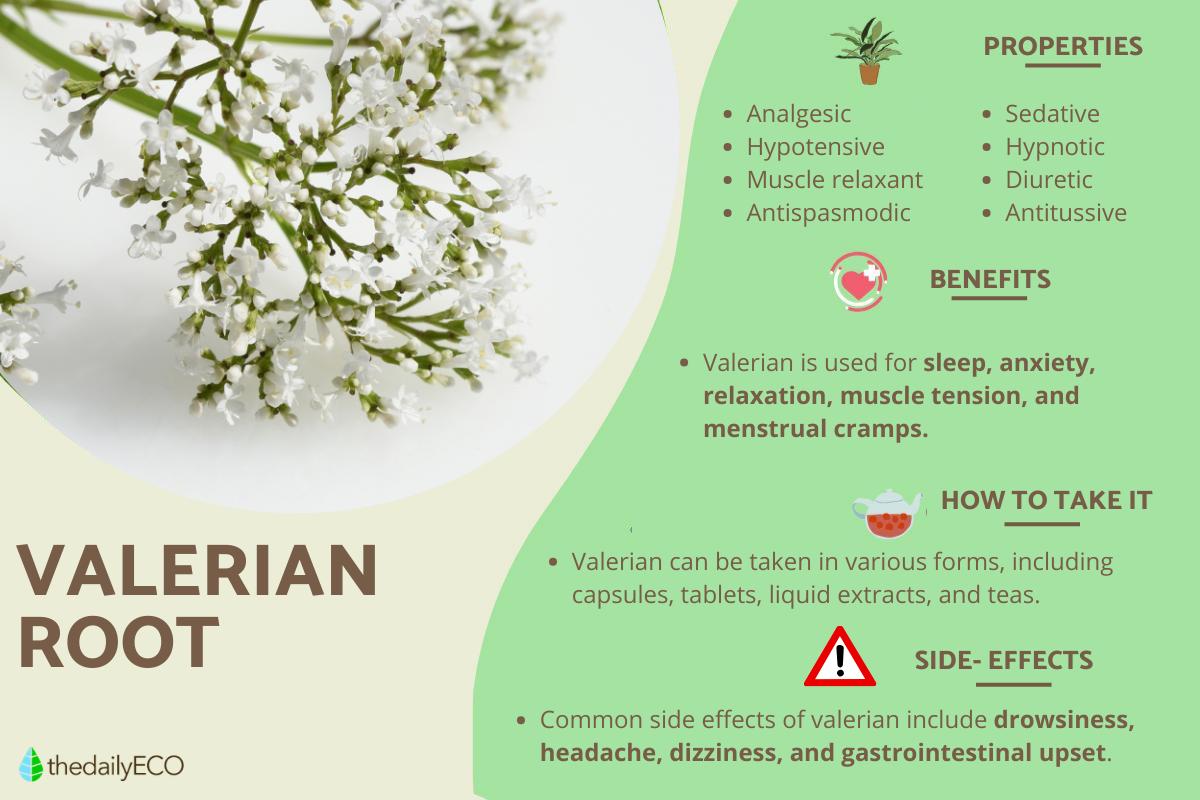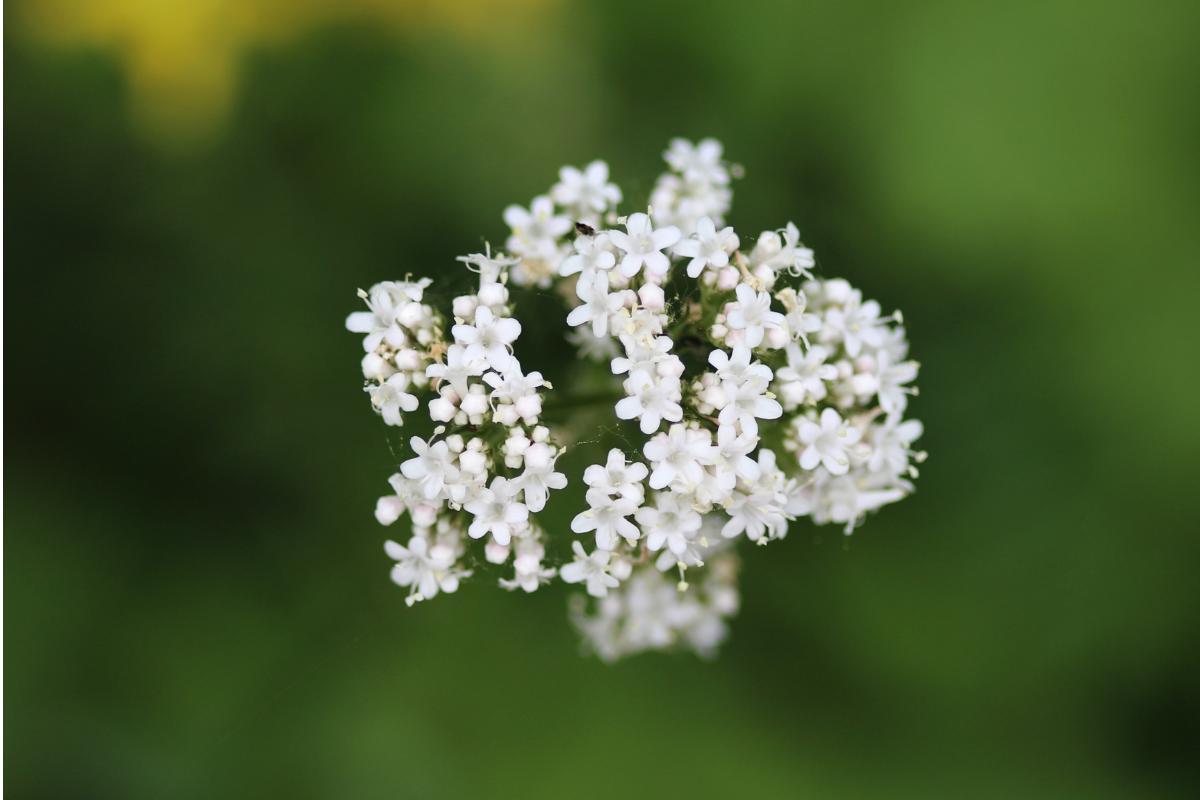How to Take Valerian Root for Sleep and Anxiety


Valerian root has been used for centuries as a natural remedy, known for its calming properties and potential to promote better sleep. But what exactly is valerian root, and how does it work? In this article, we’ll dive into the properties of this popular herbal supplement, exploring its benefits, common uses, and how to take it safely. We'll also cover important contraindications to ensure you’re well-informed before adding valerian root to your wellness routine.
Whether you're seeking a natural way to unwind or simply curious about its effects, discover how to take valerian root for improved sleep and relaxation in this informative article from thedailyECO.
Properties of valerian
Thanks to its active ingredients, valerian offers several medicinal properties, including:
- Analgesic: helps relieve pain.
- Hypotensive: aids in lowering blood pressure.
- Muscle relaxant: eases muscle tension and cramps.
- Antispasmodic: reduces spasms, particularly in the digestive and muscular systems.
- Sedative: promotes relaxation and reduces anxiety.
- Hypnotic: assists in inducing sleep, useful for insomnia.
- Diuretic: increases urine production, helping to eliminate excess fluids.
- Antitussive: soothes cough and irritations in the respiratory system.
These properties make valerian a popular natural remedy for stress, anxiety, sleep disorders, and certain physical ailments.
Did you know that lavender is renowned for its relaxing properties? Learn more about this soothing plant here.
What is valerian root used for?
Valerian root offers numerous benefits, making it one of the best natural sedatives available.
It is widely used to alleviate stress, anxiety, and nervous irritability. When we feel overwhelmed or anxious about our surroundings, a valerian infusion can help us relax by directly affecting the central nervous system, promoting a sense of calm and tranquility.
Valerian also helps reduce anxiety by slowing mental hyperactivity, making it easier to focus and unwind. Its calming properties can alleviate migraines, lower high blood pressure, and act as a muscle and nerve relaxant, easing physical tension.
In some cases, valerian has shown success in treating headaches, mood swings, arrhythmias, and body tremors. There are ongoing studies that suggest valerian may help manage obsessive-compulsive tendencies. Since these behaviors are often rooted in nervous disorders related to perfectionism and excessive control, valerian’s calming effects could be beneficial.
One of the most notable benefits of valerian is its ability to promote deep, restful sleep. For those seeking quality sleep that isn’t interrupted by racing thoughts or unresolved problems, valerian is an excellent choice. While many natural remedies exist for inducing sleep, few provide the depth and restorative quality that valerian offers. It can also shorten the time it takes to fall asleep.
Valerian may even be used in children, from the age of three, to treat certain types of convulsions. However, this should always be done under the guidance of a specialist doctor due to the potential risks involved.

How to take valerian root
The best benefits of valerian come from its root, which is harvested from September to October, after the flowering period has ended.
Valerian can be consumed in various forms, with the most common being an infusion made from valerian root. Here’s how to prepare it:
Ingredients:
- 1 teaspoon of chopped valerian root
- 1 cup of water
Instructions:
- Boil the water along with the chopped valerian root.
- Let it boil for about ten minutes.
- Turn off the heat and cover the saucepan.
- After three minutes, strain the infusion and it’s ready to drink.
The ideal intake is 1 cup daily, with a maximum of 2 cups per day. It’s advisable not to take valerian for more than 6 consecutive weeks, and breaks should be taken to prevent tolerance. Additionally, avoid excessive consumption, as it can be mildly toxic.
It is important to note that valerian can also be effectively combined with other medicinal plants for enhanced benefits:
- For anxiety and stress: pair valerian with lemon balm, passionflower, St. John’s Wort, or star anise. All these herbs can be used together for a calming effect.
- For insomnia: combine valerian with poppy flowers and hops to promote better sleep.
- To lower blood pressure: Valerian works well with hawthorn, olive, and mistletoe for those looking to manage blood pressure.
- To relax tense muscles: Mix valerian with devil’s claw and a piece of star anise to ease muscle tension.
Besides the infusion, valerian root is available in various forms, including:
- Powder
- Tablets
- Tincture:
- Fresh root juice
- Decoction for baths
- Essential oil
These various forms provide flexibility for users to choose what best fits their needs and preferences.

Contraindications of valerian root
Pregnant or breastfeeding women should avoid consuming valerian, as its compounds can be excreted through breast milk. Additionally, it is not recommended for children under three years of age due to its sedative effects.
Given its strong tranquilizing properties, valerian should not be taken alongside stimulants such as coffee, tea, ginger, cinnamon, or energy drinks, as this can counteract its calming effects.
Furthermore, individuals planning to drive should refrain from using valerian, as it can induce deep sleep, significantly increasing the risk of road accidents.
People currently taking antidepressants, sedatives, or other medications that affect the central nervous system should also avoid valerian. Additionally, mixing valerian with alcohol is not advisable, as the combination can lead to excessive sedation and increased risks.
Side effects of valerian root
While valerian root is commonly used for its calming effects, it can produce some side effects, including:
- Dry mouth
- Dizziness
- Fatigue
- Mental confusion
With long-term and continuous use, valerian may lead to more serious issues such as:
- Anxiety
- Nervousness
- Insomnia
- Gastrointestinal problems
Valerian may also affect liver function, as it can accelerate intestinal transit. In cases of excessive dosage or among sensitive individuals, it may cause digestive discomfort, including diarrhea, nausea, or gastritis.
Additionally, some users experience a “hangover effect” after prolonged consumption, which can manifest as dizziness and disorientation. In rare instances, valerian has been reported to produce an opposite effect, leading to feelings of depression in some individuals after excessive relaxation. This underscores the importance of adhering to the recommended dosage—more valerian does not equate to greater benefits.
Regular use of valerian can lead to a degree of dependence, so it is advisable to incorporate breaks between uses. To minimize risks, it’s best to avoid exceeding the recommended dosage and to take a break after approximately six weeks of regular consumption, allowing for several weeks of rest before resuming valerian use.
Did you know that lemon balm is known for its calming effects? Discover more about its benefits here.
If you want to read similar articles to How to Take Valerian Root for Sleep and Anxiety, we recommend you visit our Natural remedies category.
- Arzac, MS, Arrieta, M. a. BN, Arrieta, MB, Di Corpo, M. (2012). Pharmacological Actions of Valerian. (np): Editorial Académica Española.
- Upton, R. (1999). Valerian Root: Valeriana Officinalis: Analytical, Quality Control, and Therapeutic Monograph. United States: American Herbal Pharmacopoeia.
- Cebrián, J. (2002) Dictionary of medicinal plants. Barcelona: RBA Libros.







